Diane Wieland, Cape May County's director of tourism, makes a presentation during the tourism conference.
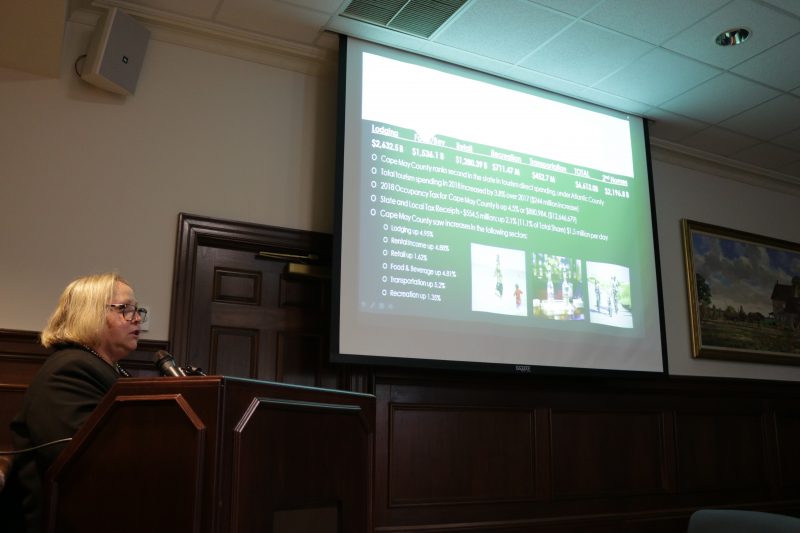 By Donald Wittkowski
Cape May County’s tourism industry is a $6.6 billion colossus that draws nearly 10 million visitors annually to an area that has diversified its attractions well beyond the ever-popular beaches and boardwalks, state and county officials said Friday.
Freeholder E. Marie Hayes described Cape May County as a “top” vacation destination that includes gourmet restaurants, fishing, historic and cultural sites, wineries, craft breweries and eco-tourism, along with family-friendly beaches and boardwalks.
“It’s like a puzzle with so many pieces,” she said in opening remarks during the 2019 Cape May County Tourism Conference in Cape May Court House.
When Hayes announced that the county’s tourism trade has grown to become a $6.6 billion-a-year industry, the audience at the Crest Haven Complex gasped at the enormity of the figure.
“It’s a beautiful, wonderful place,” Hayes said, ticking off a list of the county’s attractions. “Our beaches and boardwalks are second to none.”
The importance of the tourism industry is also reflected in the number of jobs it creates. Tourism is the “backbone” of Cape May County’s economy, generating 26,572 jobs, which represents nearly 43 percent of all employment, officials said.
“Tourism employment is a significant part of several industries – 100 percent of lodging, 44 percent of recreation, and 32 percent of the food and beverage employment is supported by visitor spending,” a 2018 county economic impact study concluded.
By Donald Wittkowski
Cape May County’s tourism industry is a $6.6 billion colossus that draws nearly 10 million visitors annually to an area that has diversified its attractions well beyond the ever-popular beaches and boardwalks, state and county officials said Friday.
Freeholder E. Marie Hayes described Cape May County as a “top” vacation destination that includes gourmet restaurants, fishing, historic and cultural sites, wineries, craft breweries and eco-tourism, along with family-friendly beaches and boardwalks.
“It’s like a puzzle with so many pieces,” she said in opening remarks during the 2019 Cape May County Tourism Conference in Cape May Court House.
When Hayes announced that the county’s tourism trade has grown to become a $6.6 billion-a-year industry, the audience at the Crest Haven Complex gasped at the enormity of the figure.
“It’s a beautiful, wonderful place,” Hayes said, ticking off a list of the county’s attractions. “Our beaches and boardwalks are second to none.”
The importance of the tourism industry is also reflected in the number of jobs it creates. Tourism is the “backbone” of Cape May County’s economy, generating 26,572 jobs, which represents nearly 43 percent of all employment, officials said.
“Tourism employment is a significant part of several industries – 100 percent of lodging, 44 percent of recreation, and 32 percent of the food and beverage employment is supported by visitor spending,” a 2018 county economic impact study concluded.
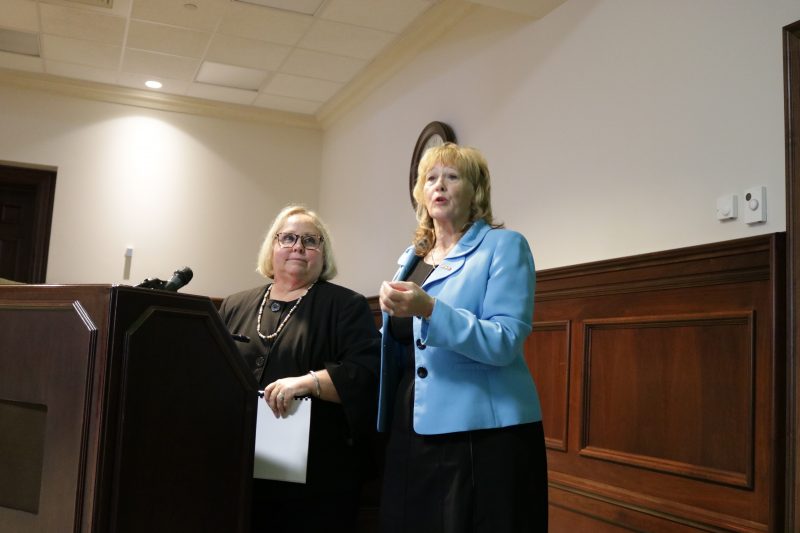 Cape May County Tourism Director Diane Wieland, left, and County Freeholder E. Marie Hayes tout the economic benefits of tourism.
In 2018, Cape May County’s tourism spending climbed 3.8 percent, or $244 million, to hit the $6.6 billion figure. Showing steady growth over the years, tourism spending in the county has more than tripled from $2 billion in 1994.
Diane Wieland, director of the Cape May County Department of Tourism, said it appears the 2019 tourism season will be another year of “slow and easy growth” in the 3.8 percent range.
Wieland, however, cautioned that much depends on the weather. Asked what is needed to create a blockbuster summer season, she replied, “80 (degrees) and sunny every day comes to mind.”
The Jersey Shore dealt with spots of rainy weather during the past two summers, but was able to recover with sunnier skies later in the season. The weather-dependent beaches remain the top draw for the resort towns.
“The number one reason people come here is the beach,” Wieland said.
Hoping to broaden the shore’s appeal to visitors, both county and state tourism officials have launched a strategy that focuses on an array of attractions – not just the beaches. They include emerging “niche markets” such as the area’s wineries, craft breweries and eco-tourism.
“People do know the Jersey Shore. They know our beaches, but we are so much more than that,” Wieland said.
Cape May County Tourism Director Diane Wieland, left, and County Freeholder E. Marie Hayes tout the economic benefits of tourism.
In 2018, Cape May County’s tourism spending climbed 3.8 percent, or $244 million, to hit the $6.6 billion figure. Showing steady growth over the years, tourism spending in the county has more than tripled from $2 billion in 1994.
Diane Wieland, director of the Cape May County Department of Tourism, said it appears the 2019 tourism season will be another year of “slow and easy growth” in the 3.8 percent range.
Wieland, however, cautioned that much depends on the weather. Asked what is needed to create a blockbuster summer season, she replied, “80 (degrees) and sunny every day comes to mind.”
The Jersey Shore dealt with spots of rainy weather during the past two summers, but was able to recover with sunnier skies later in the season. The weather-dependent beaches remain the top draw for the resort towns.
“The number one reason people come here is the beach,” Wieland said.
Hoping to broaden the shore’s appeal to visitors, both county and state tourism officials have launched a strategy that focuses on an array of attractions – not just the beaches. They include emerging “niche markets” such as the area’s wineries, craft breweries and eco-tourism.
“People do know the Jersey Shore. They know our beaches, but we are so much more than that,” Wieland said.
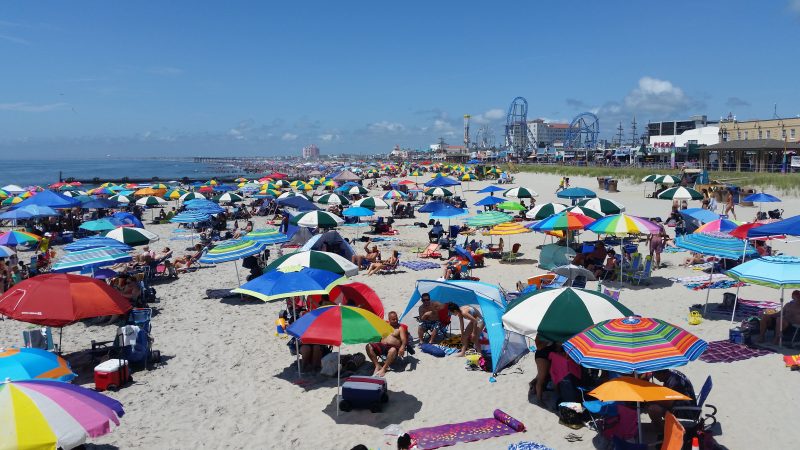 The beaches in Ocean City and other resort towns continue to be the county's top tourism draw.
New Jersey, Pennsylvania and New York remain the primary feeder markets for Jersey Shore tourism. Tourism officials are trying to tap other markets as well, including attracting more foreign travelers from Canada and other countries.
Canadians have long been a key part of Cape May County’s tourism base. They represented 7 percent of the visitors in 2018, but their numbers have been held back somewhat by the low exchange rate of the Canadian dollar, Wieland pointed out.
Once tourists visit Cape May County, they tend to come back. The visitor “return rate” is 85 percent, the figures show.
The beaches in Ocean City and other resort towns continue to be the county's top tourism draw.
New Jersey, Pennsylvania and New York remain the primary feeder markets for Jersey Shore tourism. Tourism officials are trying to tap other markets as well, including attracting more foreign travelers from Canada and other countries.
Canadians have long been a key part of Cape May County’s tourism base. They represented 7 percent of the visitors in 2018, but their numbers have been held back somewhat by the low exchange rate of the Canadian dollar, Wieland pointed out.
Once tourists visit Cape May County, they tend to come back. The visitor “return rate” is 85 percent, the figures show.
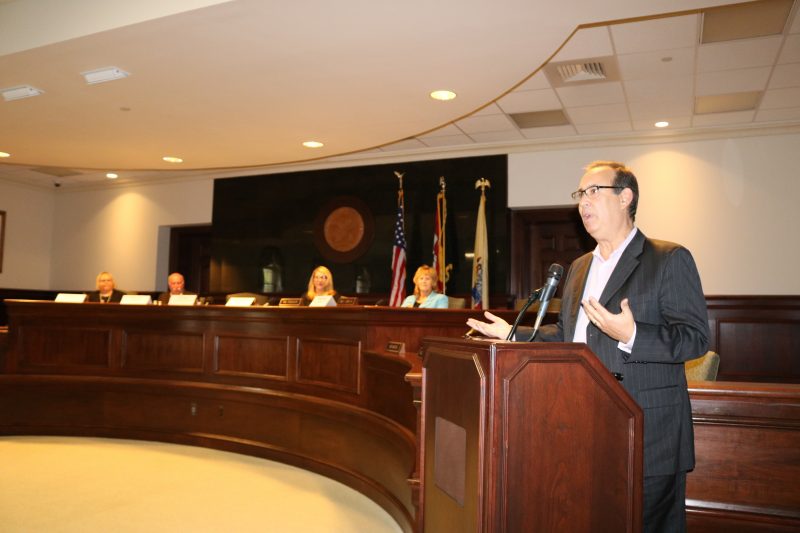 Jeff Vasser, director of the New Jersey Division of Travel and Tourism, says the growing number of visitors statewide is "fantastic."
Tourism is the seventh-largest employer in the state. Recognizing the overall importance of tourism to the state’s economy, Gov. Phil Murphy has set a goal of attracting 150 million visitors annually to New Jersey by 2023, Vasser said.
Overall in New Jersey, Cape May County ranks second only to Atlantic County – home of the casino industry – in tourism spending. Cape May County outpaces all other counties in spending on food and beverage, retail, recreation and vacation homes, according to the tourism data.
Of the $6.6 billion in Cape May County tourism spending in 2018, the lodging industry accounted for $2.6 billion of the figure. Lodging was the top revenue-generating category for tourism.
Growth in the county’s lodging sector was reflected by a 4.5 percent increase last year in revenue generated by the occupancy tax. The increase translated to more than $880,000 in extra revenue, for a total of $12.6 million in occupancy tax funds.
Hayes said state officials should pay close attention to the amount of tourism-related and tax revenue that is generated in Cape May County for New Jersey – especially when it comes to Cape May County getting its share of state funding in return.
“We hardly get anything back,” said Hayes, who also serves as the vice president of the New Jersey Association of Counties.
Jeff Vasser, director of the New Jersey Division of Travel and Tourism, says the growing number of visitors statewide is "fantastic."
Tourism is the seventh-largest employer in the state. Recognizing the overall importance of tourism to the state’s economy, Gov. Phil Murphy has set a goal of attracting 150 million visitors annually to New Jersey by 2023, Vasser said.
Overall in New Jersey, Cape May County ranks second only to Atlantic County – home of the casino industry – in tourism spending. Cape May County outpaces all other counties in spending on food and beverage, retail, recreation and vacation homes, according to the tourism data.
Of the $6.6 billion in Cape May County tourism spending in 2018, the lodging industry accounted for $2.6 billion of the figure. Lodging was the top revenue-generating category for tourism.
Growth in the county’s lodging sector was reflected by a 4.5 percent increase last year in revenue generated by the occupancy tax. The increase translated to more than $880,000 in extra revenue, for a total of $12.6 million in occupancy tax funds.
Hayes said state officials should pay close attention to the amount of tourism-related and tax revenue that is generated in Cape May County for New Jersey – especially when it comes to Cape May County getting its share of state funding in return.
“We hardly get anything back,” said Hayes, who also serves as the vice president of the New Jersey Association of Counties.
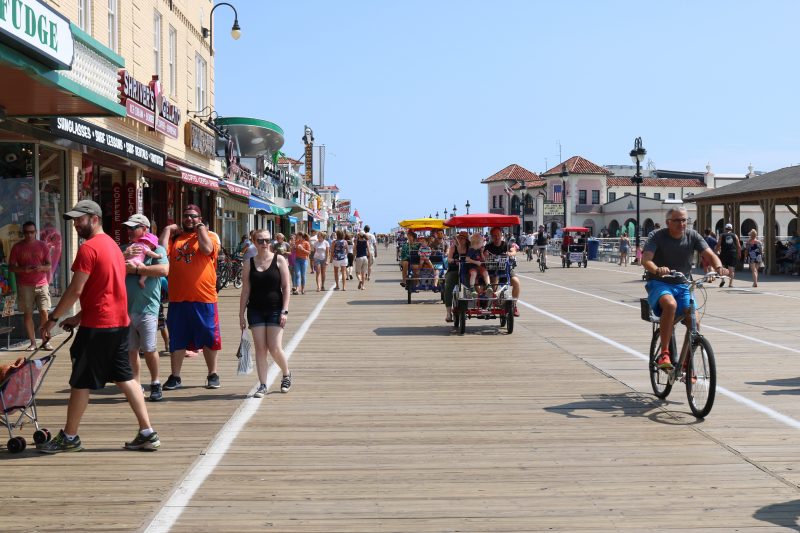 Ocean City's family-friendly Boardwalk attracts big crowds each year.
Despite overall growth in New Jersey and Cape May County tourism, there are some potential headwinds for the industry, officials explained.
For instance, Cape May County leaders are opposed to the state Legislature’s decision to raise the minimum wage to $15 per hour by 2024, arguing that it will harm small businesses at the shore and elsewhere.
State Assemblyman R. Bruce Land, D-Cape, Cumberland, Atlantic, told the tourism conference that he voted against the legislation to raise the minimum wage because it will hurt the small businesses connected to the tourism and fishing industries. He indicated that he hopes the legislation will be revised to give small businesses some relief.
Land also noted that the Legislature is working to roll back occupancy taxes from short-term home rentals – something that has made it more expensive to rent vacation homes at the shore. He said in some cases, rentals are as much as $800 to $1,000 higher because of the tax.
A law that took effect last October was written with online booking giants like Airbnb in mind for higher occupancy taxes. However, it also applies to rentals directly booked by homeowners.
A Jersey Shore lawmaker, state Sen. Bob Andrzejczak, D-Cape, Cumberland, Atlantic, has sponsored a bill to exempt private, short-term rentals from additional taxes, giving homeowners some help.
“The law was originally intended to tax major commercial companies such as Airbnb, but it ended up hurting small, private renters all along the shore,” Andrzejczak said in a press release.
The Andrzejczak-sponsored bill, which was approved Monday by the Senate Community and Urban Affairs Committee, would still charge taxes on shore rentals booked online through Airbnb, Vrbo and other lodging websites.
Ocean City's family-friendly Boardwalk attracts big crowds each year.
Despite overall growth in New Jersey and Cape May County tourism, there are some potential headwinds for the industry, officials explained.
For instance, Cape May County leaders are opposed to the state Legislature’s decision to raise the minimum wage to $15 per hour by 2024, arguing that it will harm small businesses at the shore and elsewhere.
State Assemblyman R. Bruce Land, D-Cape, Cumberland, Atlantic, told the tourism conference that he voted against the legislation to raise the minimum wage because it will hurt the small businesses connected to the tourism and fishing industries. He indicated that he hopes the legislation will be revised to give small businesses some relief.
Land also noted that the Legislature is working to roll back occupancy taxes from short-term home rentals – something that has made it more expensive to rent vacation homes at the shore. He said in some cases, rentals are as much as $800 to $1,000 higher because of the tax.
A law that took effect last October was written with online booking giants like Airbnb in mind for higher occupancy taxes. However, it also applies to rentals directly booked by homeowners.
A Jersey Shore lawmaker, state Sen. Bob Andrzejczak, D-Cape, Cumberland, Atlantic, has sponsored a bill to exempt private, short-term rentals from additional taxes, giving homeowners some help.
“The law was originally intended to tax major commercial companies such as Airbnb, but it ended up hurting small, private renters all along the shore,” Andrzejczak said in a press release.
The Andrzejczak-sponsored bill, which was approved Monday by the Senate Community and Urban Affairs Committee, would still charge taxes on shore rentals booked online through Airbnb, Vrbo and other lodging websites.
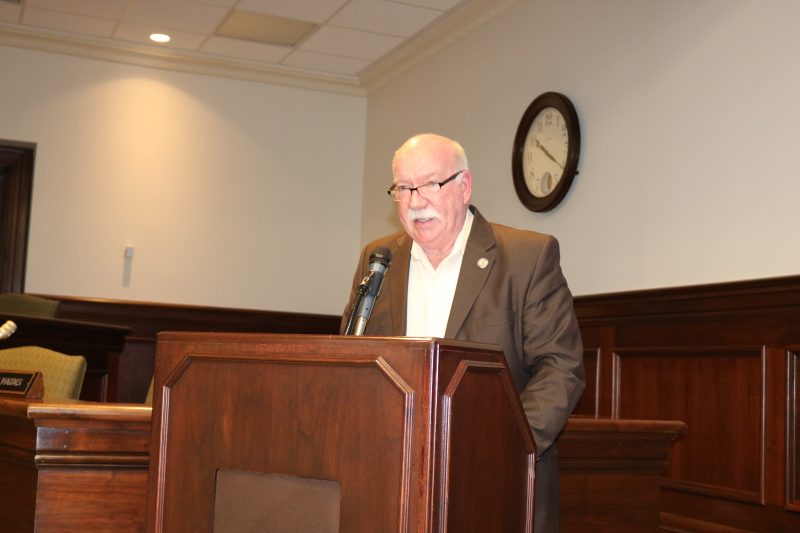 State Assemblyman R. Bruce Land, who represents the Jersey Shore, is hopeful of some legislative changes to help tourism.
State Assemblyman R. Bruce Land, who represents the Jersey Shore, is hopeful of some legislative changes to help tourism.